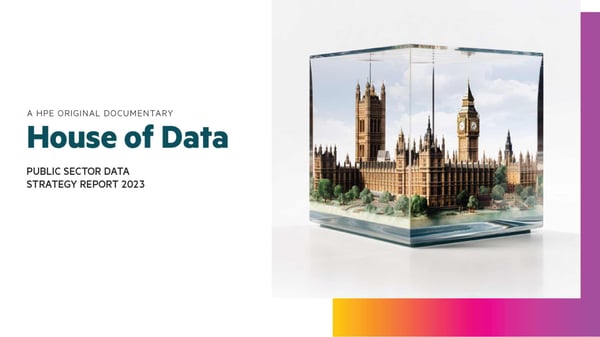Putting AI to work: How the public sector is preparing for an intelligent future
Artificial intelligence is no longer a distant promise - it’s rapidly becoming a core part of how public services are delivered, decisions are made, and operations are managed across government.
At the upcoming Government Transformation Summit (24-25 June, Church House, Westminster), the AI stream offers a comprehensive exploration of how the UK public sector is navigating this technological shift, from high-level strategy to day-to-day integration. With leaders from across Whitehall, local authorities, and arm’s-length bodies contributing, this stream will tackle the real challenges of adopting AI at scale - and the even bigger opportunities. 
From national strategy to daily operations
The summit builds directly on the momentum of the AI Opportunities Action Plan, with early sessions asking how the vision of that plan is being realised across government. In the AI strategy discussion, Chris Darriet Jones, Chief Data Architect at the Post Office, and Simon Short, Director of Data & AI at Homes England, will examine how AI strategy is being translated into operational change - and what’s needed to ensure real impact across departments.
This theme continues in Operationalising AI, where Shehroze Junejo, Executive Director and Chief Data Officer at UK Government Investments, will look at what it takes to embed AI deeply and responsibly into systems and services. For many departments, the question is no longer why AI, but how - and how fast.
Making the case for real-world applications
AI’s impact on public sector efficiency is already visible in specific, tangible use cases. The discussion table on AI Use in Government, co-hosted by Matthew Lyon, Chief Analyst at GDS, and Lucy Vickers, Chief Data Officer at the Department of Health and Social Care, will showcase practical examples of AI in action - from improving service outcomes to automating internal processes.
Meanwhile, enhancing public services and intelligent automation sessions will explore how AI is already being applied to everything from triaging healthcare enquiries to reducing routine admin in social services. These sessions will highlight how AI helps public servants do more with less, without losing the human touch.
From augmentation to autonomy
As the role of AI evolves, attention is turning to more advanced capabilities — such as Agentic AI, where systems act not just as support tools, but as autonomous agents. This session will explore how AI is beginning to manage workflows, support frontline staff, and even make recommendations or decisions within tightly governed parameters. From public health to infrastructure, the opportunities are enormous — but so are the risks. As governments move from automation to autonomy, questions around trust, oversight and safety become central.
A related conversation - AI Human Teaming - will explore how the most effective uses of AI will be collaborative, not competitive. By enhancing rather than replacing human capabilities, AI can help government teams navigate complexity and respond faster to evolving citizen needs.
Trust, ethics and good governance
No conversation about public sector AI would be complete without addressing trust. The session on Ethical AI, co-hosted by Verity Hislop, Senior Project Manager at the Digital Office for Scottish Local Government, and Sholthana Begum, Chief Technology Officer and Senior Director at the Competition and Markets Authority, will explore how departments are ensuring fairness, transparency and accountability in AI systems.
Building on that, AI Governance and Building Trustworthy AI discussion sessions will tackle how government is developing robust governance models to oversee AI deployment responsibly. In the latter, Diane Barlow, Chief Information Officer at the Food Standards Agency, will share how ethical frameworks and technical safeguards are being used to inspire public confidence and ensure AI supports rather than undermines democratic values.
The rise of generative AI
Perhaps the most headline-grabbing area of AI today is Generative AI. This session will dive into its fast-moving potential — from summarising vast policy documents to crafting personalised responses for citizen services. Esra Kasapoglu, Director of AI and Digital Economy at Innovate UK, and Sam Rose, Deputy Director of Advanced Analytics at the Department for Transport, will help shape the debate around where to start: quick wins or long-term transformation?
Scaling AI the right way
The session on Scaling-up Adoption will address one of the biggest challenges facing departments: how to move from pilot to enterprise-level implementation. It’s not just about tech - it’s about upskilling teams, establishing strong data governance, and embedding a culture of innovation that can keep pace with the capabilities AI offers.
That focus on people continues in Skills, Work & Productivity, co-hosted by Thomas Beautyman, Deputy Director of Government Digital Capability at GDS, and James Freed, Deputy Director at the NHS Digital Academy. This session will look at how to prepare the DDaT profession to lead the AI revolution, ensuring staff are equipped with the skills, mindset and resilience to embrace intelligent tools.
Toward a more adaptive, agile government
Across all sessions, a central theme emerges: AI offers not just a technical upgrade, but a strategic shift in how government operates. From strategy to ethics, from experimentation to delivery, the public sector is approaching AI with growing clarity - and a strong commitment to doing it right.
At Government Transformation Summit, the AI stream offers attendees a chance to engage with the leaders shaping this future. Whether you’re already implementing AI or just beginning to explore its potential, this is where the most pressing questions and promising answers will be discussed.
Be part of the AI conversations on Wednesday 25 June — register now to secure your place.





